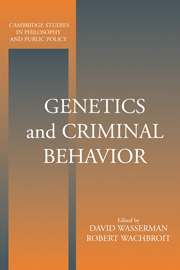Book contents
- Frontmatter
- Contents
- List of Contributors
- Acknowledgments
- 1 Introduction: Methods, Meanings, and Morals
- PART I
- PART II
- 8 Crime, Genes, and Responsibility
- 9 Genes, Statistics, and Desert
- 10 Genes, Electrotransmitters, and Free Will
- 11 Moral Responsibility without Free Will
- 12 Strong Genetic Influence and the New “Optimism”
- 13 Genetic Predispositions to Violent and Antisocial Behavior: Responsibility, Character, and Identity
- Index
11 - Moral Responsibility without Free Will
Published online by Cambridge University Press: 05 June 2012
- Frontmatter
- Contents
- List of Contributors
- Acknowledgments
- 1 Introduction: Methods, Meanings, and Morals
- PART I
- PART II
- 8 Crime, Genes, and Responsibility
- 9 Genes, Statistics, and Desert
- 10 Genes, Electrotransmitters, and Free Will
- 11 Moral Responsibility without Free Will
- 12 Strong Genetic Influence and the New “Optimism”
- 13 Genetic Predispositions to Violent and Antisocial Behavior: Responsibility, Character, and Identity
- Index
Summary
The title of this chapter sounds like a contradiction in terms, but let me try to persuade you otherwise. The idea that moral or ethical value judgments can be made about people who are metaphysically unfree is, to begin with, familiar from Spinoza's Ethics. If we properly understand the notion of justice, we can make room for judgments of moral responsibility and accountability as well, without having to reassure ourselves that human beings have free will. In a virtue-ethical framework, I argue that if we understand moral obligation and social justice as calling for certain sorts of practical attitudes, or motivations, on the part of individuals and citizens, we can obviate the question of free will and still deal credibly and, if I may say, responsibly, with issues of genetic predisposition that have put such stress on recent thinking about individual and social morality. But let me first discuss the question of free will in a more general way.
The idea of moral responsibility without free will is not a contradiction, if the idea of a good society can substitute for the idea of free will in providing a basis for the punishments, penalties, incentives, and rewards that are the hallmark of moral and social accountability. Human beings, whether metaphysically free or not, can be placed in morally better or worse social conditions; and the laws instituted by a good or just society have or can have a legitimate authority over its members whatever the metaphysical status of their wills.
- Type
- Chapter
- Information
- Genetics and Criminal Behavior , pp. 259 - 272Publisher: Cambridge University PressPrint publication year: 2001
- 1
- Cited by



